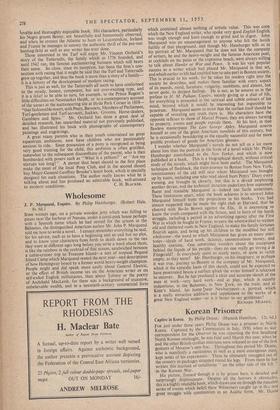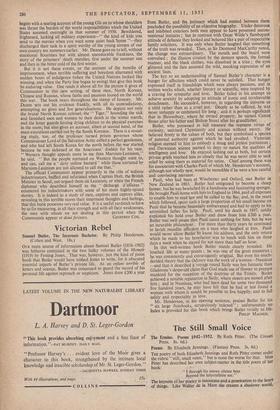Korean Prisoner
FOR just under three years Philip Deane was a prisoner in North Korea. Captured by the Communists in July, 1950, when as war correspondent for the Observer he was reporting the first headlong North Korean onslaught, he was beld until March this year, when he and the other British civilian internees were released as one of the first gestures of Moscow's new line. Throughout this period Mr. Deane, who is manifestly a meticulous as well as a most courageous man, kept notes of his experiences. These he ultimately smuggled out of the country in packages strapped round his legs. From them he has written this account of conditions " on the other side of the hill " in the Korean War.
His picture, framed• though it is by prison bars, is detailed and surprisingly dispassionate. Despite all the horrors it chronicles, this is a highly readable book, which draws one on through the mactibee series of events which befell these Westerners caught up in th.s first great struggle with communism in an Asiatic forma Mr. Dane begins with a searing account of the young GIs on to whose shoulders was thrust the burden of the world responsibilities which the United States assumed overnight in that summer of 1950. Bewildered, frightened, lacking all military experience—" the kind of kids you send to the movies when you want some quiet back 'home "—they discharged their task in a spirit worthy of the young airmen of our own country ten summers earlier. Mr. Deane goes on to tell, without emotional flourishes but with almost unendurable frankness, the story of the prisoners' death marches, first under the summer sun and then in the bitter cold of the first winter.
But it is not these events, or the account of the months of imprisonment, when terrible suffering and boredom alternated with sudden bouts of indulgence (when the United Nations looked like winning, and when the Party line began to swing) that give this book its enduring value. One reads it above all for the picture it gives of Communism in this new setting, of these men, North Korean, Chinese and Russian, whose faiths and passions loosed on the world this war. The book bears throughout the stamp of honesty. Mr. Deane sets out his evidence frankly, with all its contradictions,• attempting no gloss and few generalisations. He depicts not only the brutal North Korean colonel, the " Tiger," hounding the sick and famished men and women to their death in the winter march, and the lesser guards forcing dying children to do physical exercises. in the snow, but also gives an account, albeit at second hand, of the mass executions-carried out by the South Koreans. There is a reveal-' ing study, too, of the professor turned prison governor whom Commissioner Lord of the Salvation Army called a perfect gentleman,. and who had left South Korea for the north before the war started, because he was sickened at the Americans' disdain for his race. " Western thought appeals more to me than Marxism-Leninism," he said. " But the people nurtured on Western thought want to,' and can, call me a dirty yellow bastard ' while those nurtured by Marxism-Leninism are not allowed to call me that."
The official Communists appear primarily in the role of tedious indoctrinators, baffled and infuriated when Captain Holt, the-British Minister in Seoul, out-argued them on Leninism, or when the French diplomat who described himself as the " &charge d'affaires countered his indoctrinators with some of his more highly-spiced stories. It is indeed as a study of men, captives and captors alike, revealing in, this terrible storm their innermost thoughts and feelings, that this book possesses very real value. It is a useful yardstick to have by us for measuring, in all their strength and with all their weaknesses, the men with whom we are dealing in this period when the Communists appear et dona ferentes. GEOFFREY Cox.



































 Previous page
Previous page